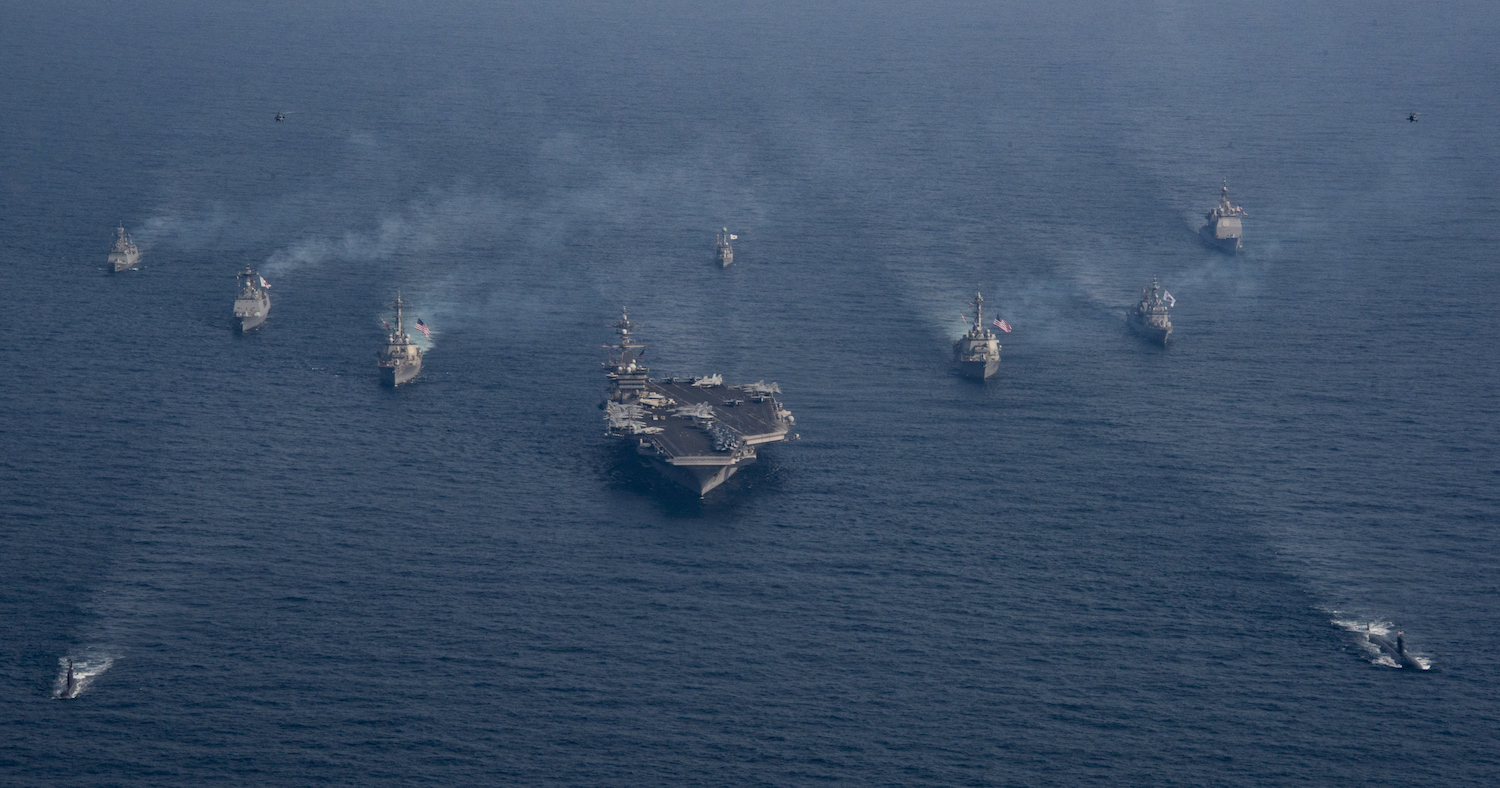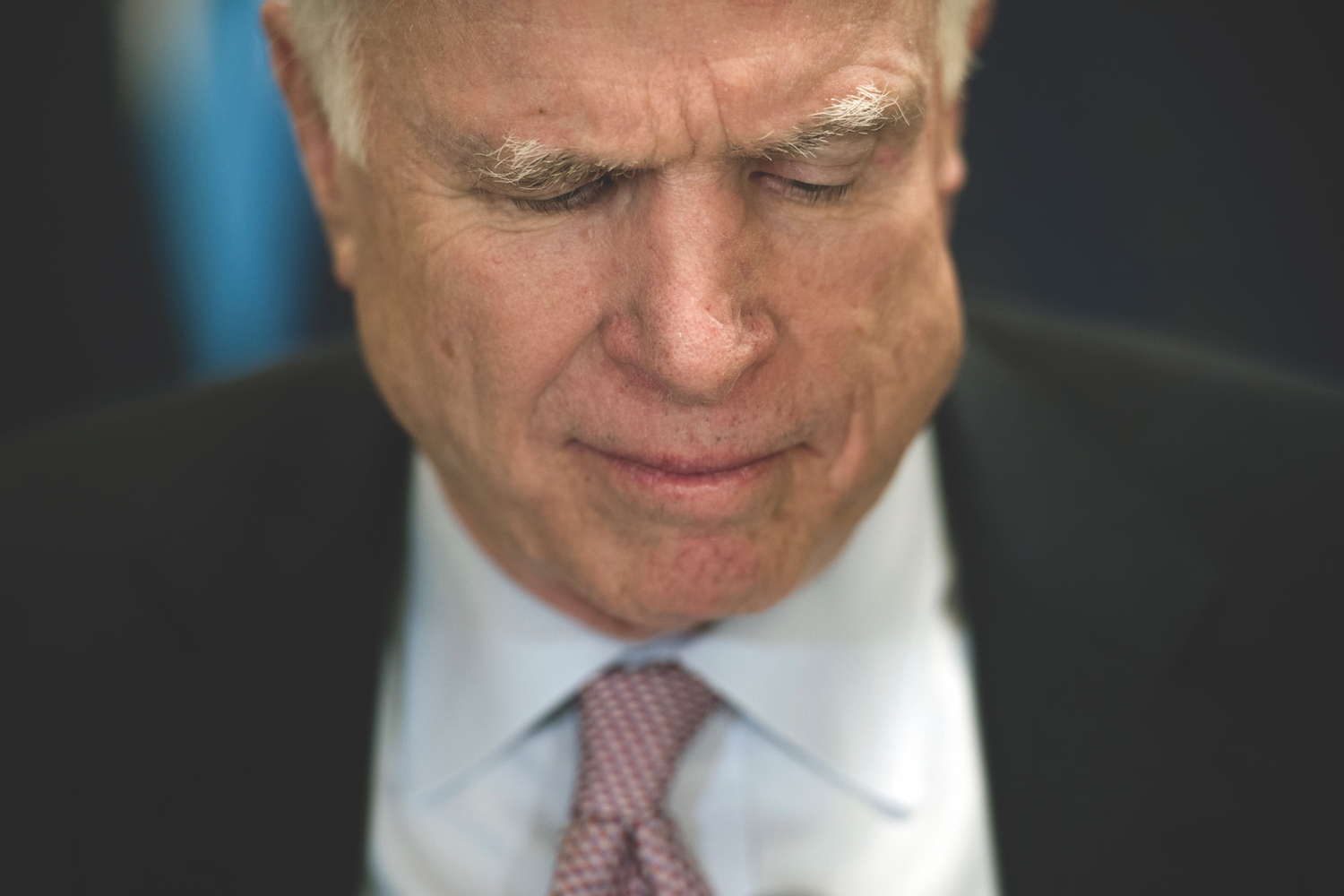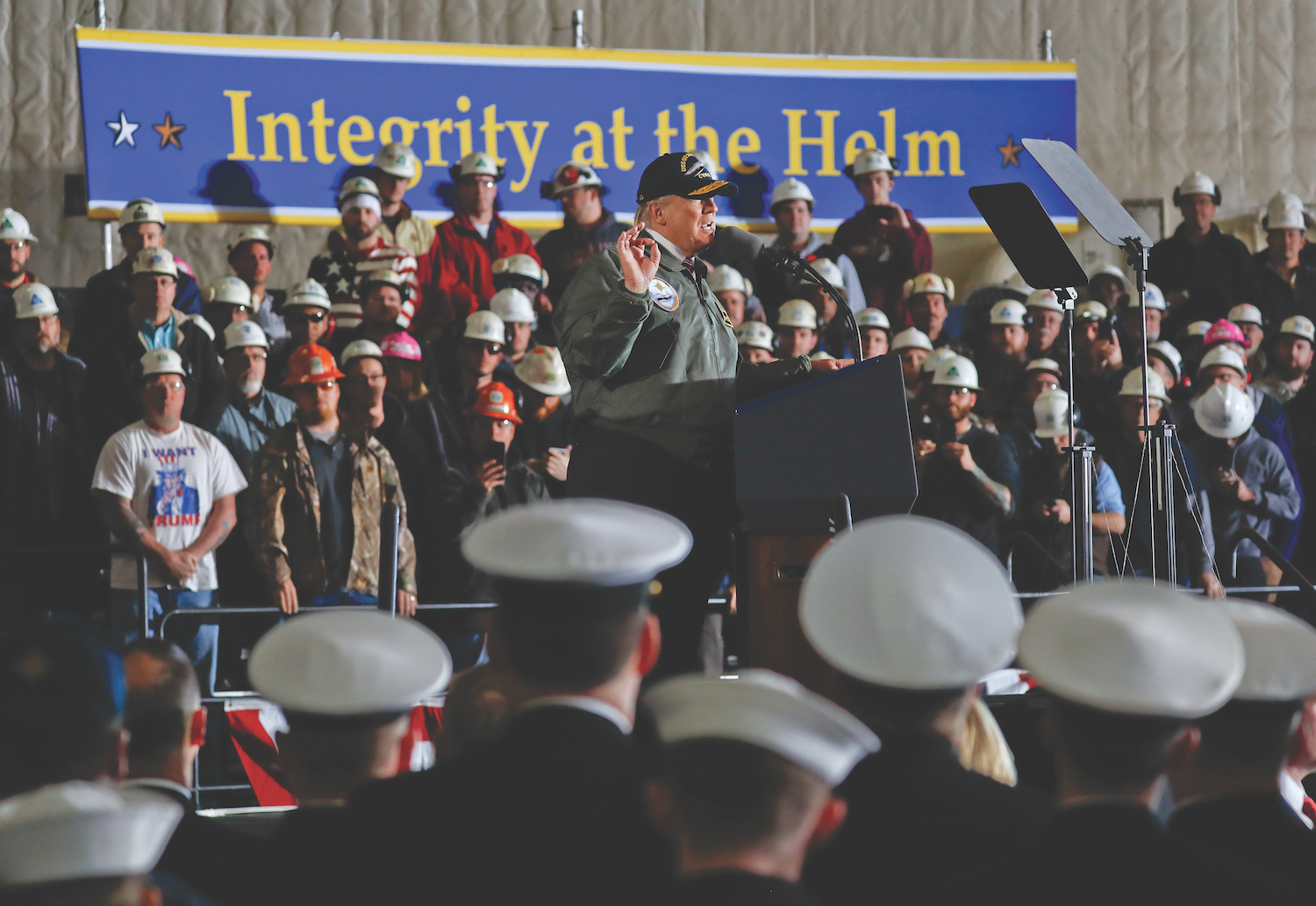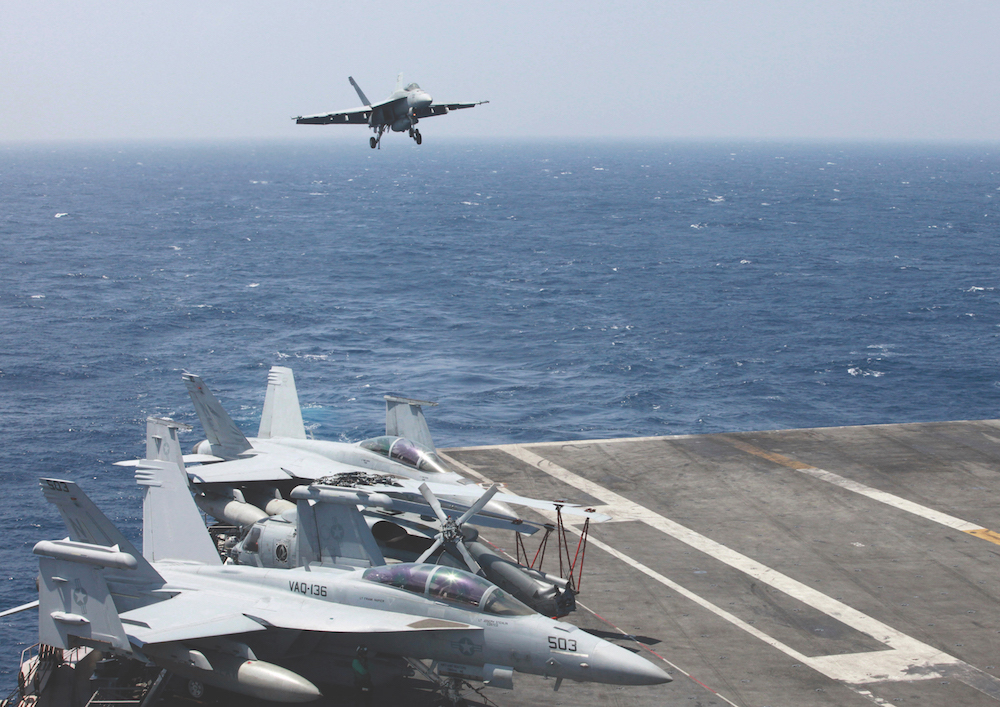Only three months on the job in Washington, Rep. Jim Banks, R-Ind., says he is ready to help out his fellow members of the U.S. armed forces, especially his naval comrades, ahead of a potential spending fight as a government shutdown looms in late April.
A lieutenant in the Navy Reserve, Banks is a freshman member looking to make a difference for the U.S. military from his spot on the House Armed Services Committee. He wants to reverse the perceived “readiness crisis” throughout branches of the armed services, the subject of repeated testimony from commanders recently.
In an interview with the Washington Examiner, the freshman congressman and member of the House Armed Services Committee gave his take on the top priorities for the Navy, President Trump’s plan to increase the number of ships in the Navy to 350 and the need for an appropriations budget rather than another continuing resolution that he says would do harm to the U.S. military.
Washington Examiner: As you prepare to view the fiscal 2017 supplemental and the fiscal 2018 budget, what do you see as the biggest priorities for the Navy in the next year?
Banks: Well, this is my first experience at all of this, so as I learn about the budget process, I’ve learned a lot over the last three months about the inadequacies of funding the government through continuing resolutions rather than passing a full fiscal year appropriations budget, especially when it comes to the military. So over the past few months, as you know, we did pass the fiscal year ’17 defense appropriations budget out of the House. It’s, unfortunately, stalled in the Senate. First and foremost, to answer your question, we need to get back into a regular order of funding the military through annual appropriations budgets rather than through this poor process of continuing resolutions, which is literally holding back the military as we face the readiness crisis. But I support the efforts to substantially fund the military at a higher rate. The president’s budget was $603 billion. I support the McCain/Thornberry budgets of over $640 billion for the next fiscal year 2018. It’s just imperative on so many levels related to the military at large that we do that. Specifically about the Navy, the readiness crisis, like in each of the other branches, is significant and real. When combatant commanders are telling us that only 40 percent of their requests for the use of the Navy are being met due to current funding shortfalls, we have a readiness crisis in the Navy that’s as significant and real as we face in any of the other branches.

President Trump plans to increase the number of ships in the Navy to 350 ships and 12 aircraft carriers. (AP Photo)
Washington Examiner: How important is it that President Trump realize his goal of 350 ships and 12 aircraft carriers? It’s an expensive proposition. Do you think it’s realistic?
Banks: Not just realistic, it’s absolutely necessary. As someone who believed in the Reagan vision of the Navy for 600 ships, 350 ships is almost half of the Navy of the Reagan era, which I believe was significant to creating national security and security and peace around the world and the projection of strength of the American Navy during the Reagan era. So I believe it’s absolutely necessary. We’re at about 270 ships in the Navy today. I think an increase to 350 is realistic. It’s necessary when you talk about the carrier gap in the Middle East and the Persian Gulf, for example, where we have the president’s goal of growing to 12 carriers because of the gap we see in the Persian Gulf and around the world of a lack of presence. We have to get there to grow the Navy presence around the world again.
Washington Examiner: What do you believe is the optimal fleet mixture? Are we talking about more small ships, like frigates, more littoral combat ships, more destroyers or a combination of all three?
Banks: It’s a combination of all of the above. The carrier presence is significant on that end of the spectrum, [and] small ships are significant too. Again, the United States Navy is a projection of American strength around the globe, and I believe it’s the greatest deterrence to those who seek to do harm to America. We talk about the big four threats — the threats from Russia, North Korea, China and Iran. The projection of naval strength around the world in combating those four threats and projecting our authority around the world, not just to benefit the United States of America and our national security, but to benefit peace around the globe, the Navy is so fundamental to that, and to the War on Terror, the Navy is fundamental too. But I believe the projection of strength by the United States Navy by meeting this president’s goal of 350 ships and a combination of all of the above is fundamental to projecting strength and creating stability around the globe, especially with those four threats.
Washington Examiner: On the same note, how important are submarines?
Banks: Significantly important. I’m not an expert. I’m a Navy Reserve officer. I was a supply corps officer in the United States Navy Reserve. I deployed to Afghanistan as a Navy officer, so I never spent time at sea. I’m not an expert in submarines, but when we learn more about the threats from, again, those four and the submarine presence that some of those countries have around the world that are a threat to American ships to counteract that, our submarine presence is significant, as well as our anti-submarine efforts being significant as well.

“The president’s budget was $603 billion. I support the McCain/Thornberry budgets of over $640 billion for the next fiscal year 2018,” Banks said. (AP Photo)
Washington Examiner: Navy and Marine leaders have been testifying on Capitol Hill over their readiness concerns. What is your view on those concerns? How important is it that the readiness accounts be funded? And what are the highest priorities?
Banks: Each of the branches have testified before the Armed Services Committee about the readiness crisis specific to their branch. Most revealing to me by each of the branches was the candor from their leadership about how the readiness crisis and the process of funding the military through continuing resolutions rather than through annual appropriations bills have created significant hardships on their ability to prepare for the future, and that’s key and fundamental. When we talk about rebuilding the military, the stability of the military during its growth to catch back up after the Budget Control Act [BCA], the sequestration. [Rebuilding means] ridding the process of sequestration and getting rid of the Budget Control Act to allow the stability of the military, to prepare for the future. It’s not just about Iraq and Afghanistan. The wars of today are about preparing for what comes next, and that’s why the testimony before the committee by each of the branches of what it’s going to take to rebuild and prepare for the future has been a significant learning lesson for me as a freshman member of Congress who’s just been here for three months.
Washington Examiner: What is your view on the extent to which President Trump has inserted himself in the procurement process? Does it help, or is it a hindrance?
Banks: I think it’s a significant help. It’s an appropriate role of the president, the commander in chief, to take an interest in the process. I’m grateful that this is a president that understands the importance of the value of the military. I believe that, and just his first couple of months of this administration, we’ve seen a refreshing level of activity and interest in the military from this president that we didn’t, that we never saw from the previous president, which was always concerning to me as someone who served myself, that we had a commander in chief that fundamentally didn’t trust the military, didn’t trust the military leadership. The president that we have today trusts the military leadership, and he’s committed to doing what it takes to make this military strong again.
Washington Examiner: Lawmakers point out that the supplemental, as written, would trigger automatic sequestration cuts. Why do you think the supplemental was built this way? Is it possible to get this through?
Banks: That’s a question that’s above my pay grade as a freshman member of Congress who’s been here for three months. But we did pass the appropriations bill over to the Senate that has yet to be taken up or taken seriously by the Senate to move that forward, but as far as the supplemental goes and the BCA, I am deeply committed as a new member of Congress to ridding the military of the BCA, the sequestration that is substantially preventing us from doing what we need to do, to address the readiness crisis we face in the military today.

“It’s an appropriate role of the president, the commander in chief, to take an interest in the process. I’m grateful that this is a president that understands the importance of the value of the military,” Banks said. (AP Photo)
Washington Examiner: We touched on this a little earlier on the CR. Do you think a full-year CR will do as much damage as people are saying?
Banks: Absolutely. There’s no question. If you sit through the testimonies of each of the branches and their leadership and understand what the CR is doing to limit their ability to prepare for the future and fully fund necessary programs to rebuild the military, make it strong again, you realize this is the wrong way to fund our military during this perilous point in our nation’s history, where we live in a tumultuous world with the big four threats that we face. Plus, the rise of ISIS and other threats related to radical extremist groups around the globe who seek to do harm to America and its allies.
Washington Examiner: What do you think the chances are that Republicans can persuade Democrats to agree to end the sequester? Is there common ground to work toward?
Banks: I find a refreshing, bipartisan spirit on the Armed Services Committee. Many of my Democrat colleagues, especially many of them who have served in the military themselves, they agree that the sequester has greatly diminished the military and limited the ability of the military to rebuild and grow to meet the threats that we face. I believe that conversation has been refreshing because Democrats have agreed and participated in each of those hearings that we’ve held so far in the committee. It’s a very bipartisan committee. I could name a number of names, but I won’t do that out of respect to my Democratic colleagues who may not want their names mentioned, but many of them have been engaged. They agree that the BCA has done tremendous harm to our military, and there is a bipartisan effort in this Congress to rid the military of this terrible process of funding the important work that they do.
Washington Examiner: Are you in favor of continuing to use the overseas contingency operations account?
Banks: I am. As the most recently deployed member of Congress — two years ago from today, I was serving in Afghanistan — I know all too well what the threats that our troops face in Iraq and Afghanistan and other hot spots around the world [are]. I’m fully committed to continuing to fund those programs.

Banks wants to reverse the perceived “readiness crisis” throughout branches of the armed services, the subject of repeated testimony from commanders recently. (AP Photo)
Washington Examiner: With regard to China, do you agree that the Navy should step up its freedom-of-navigation operations in the South China Sea?
Banks: Yes. Simple answer is yes. The threats that we face from China are too great, and it’s absolutely necessary that we support our allies there and maintain a presence.
Washington Examiner: In Europe, what is your view on Russia’s provocative actions against ships in the Black and Baltic seas? How should the U.S. respond?
Banks: Again, deeply troubled by a number of activities by Russia in recent weeks and months that we have to continue to pay attention to, and support our allies like Romania and others who are supportive of our efforts as well, so a continued presence there is fundamental and critically important.
Washington Examiner: Similarly, should the U.S. be taking a more aggressive posture in the Persian Gulf when U.S. ships are harassed by Iranians?
Banks: There’s no question. It’s absolutely necessary that we do. But again, in each of the circumstances that you are asking about, we can’t get there if we don’t fundamentally rebuild the military, to add to the fleet, to add to the funding to each of the branches so that we can meet the threats that we face.

